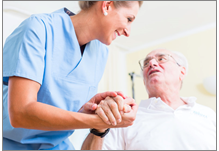
Why In-Home Care Is Important After a Hospital Discharge
Whether you've recently had a hospital stay or it's been several years since your last surgery, those first few days to weeks after discharge can make or break a full recovery. This is especially true for older adults. The frequency of hospital readmissions within 30 days of discharge seems to be on a slight decline for Medicare patients. However, the highest risk for readmission continues to be within those first 30 days after a hospital stay.
Fortunately, in-home care provided by Visiting Angels Chesterfield-Richmond can help older adults reduce their risk for re-hospitalization. Here are four reasons why in-home care is important after a hospital discharge and how Visiting Angels can help.
Ensures Discharge Plans are Followed
Most hospital readmissions could be avoided by simply following physician orders. Yet, most older adults aren't always the most compliant because they don't have a strong support network at home. It's also possible that they don't fully understand their discharge instructions. In-home care can become that strong support network as older adults recover from surgery or an illness. Caregivers can assist with basic activities of daily living, such as grooming, bathing, dressing, and toileting, to prevent overexertion. They can gently remind their client about their post-hospital instructions and provide medication reminders to take their medications as prescribed.
Helps Prevent Nutritional Deficits
After a hospital stay, many older adults don't have the strength, energy, or endurance to meal plan, let alone go grocery shopping. While some friends or family members may bring an occasional meal, older adults can't rely on someone else to meet their nutritional needs. They could have diet restrictions in place or not feel like eating at all. In-home care can help prevent nutritional deficits that can occur during those first 30 days post-discharge. Not only can a caregiver help with meal planning and preparation, but they can also do the grocery shopping for their client or escort them if the client prefers. Caregivers can share a meal with their clients to encourage them to eat more. They can even offer bites of food and encourage hydration throughout their visit to assist with the healing process.
Reliable Source of Transportation
Weakness and fatigue experienced after a hospital stay can also make it challenging for older adults to get to follow-up appointments. Some older adults may have driving restrictions. Others may just not have the strength to drive and navigate medical complexes. Families may have to work during office hours, making scheduling a nightmare. Yet, these follow-up appointments and outpatient therapy treatments are crucial to preventing hospital readmissions. Here's where in-home care can help. Caregivers can escort their clients to these appointments and walk them to the waiting area. Caregivers can take notes during the follow-up appointment to relay to family members if necessary.
Caregivers Serve as a Second Set of Eyes
Another benefit to in-home care after a hospital stay is that caregivers serve as a second set of eyes. Caregivers are highly skilled and experienced in noticing any changes in their client's health. Any sudden change could indicate a post-hospital complication. Older adults need someone to check in with them frequently after a hospital stay and watch for appearance, demeanor, or cognition changes. They also need someone to encourage them to complete their home exercises to help them regain balance, strength, and endurance.
Whether you've recently had a hospital stay or have a hospital stay in your future, Visiting Angels Chesterfield-Richmond is here to help older adults reduce their risk for re-hospitalization. Care can be arranged before a planned surgery so that your caregiver can become familiar with your discharge plans. We can also meet with the family in the event of an unplanned hospitalization so that your transition home is as smooth as possible. As you regain strength and endurance, we can adapt your care plan to meet your changing needs. Once you are back to normal, you can continue with care at a reduced frequency or discontinue altogether. To learn more about our in-home senior care services, please get in touch with us today by calling 804-423-6500.
